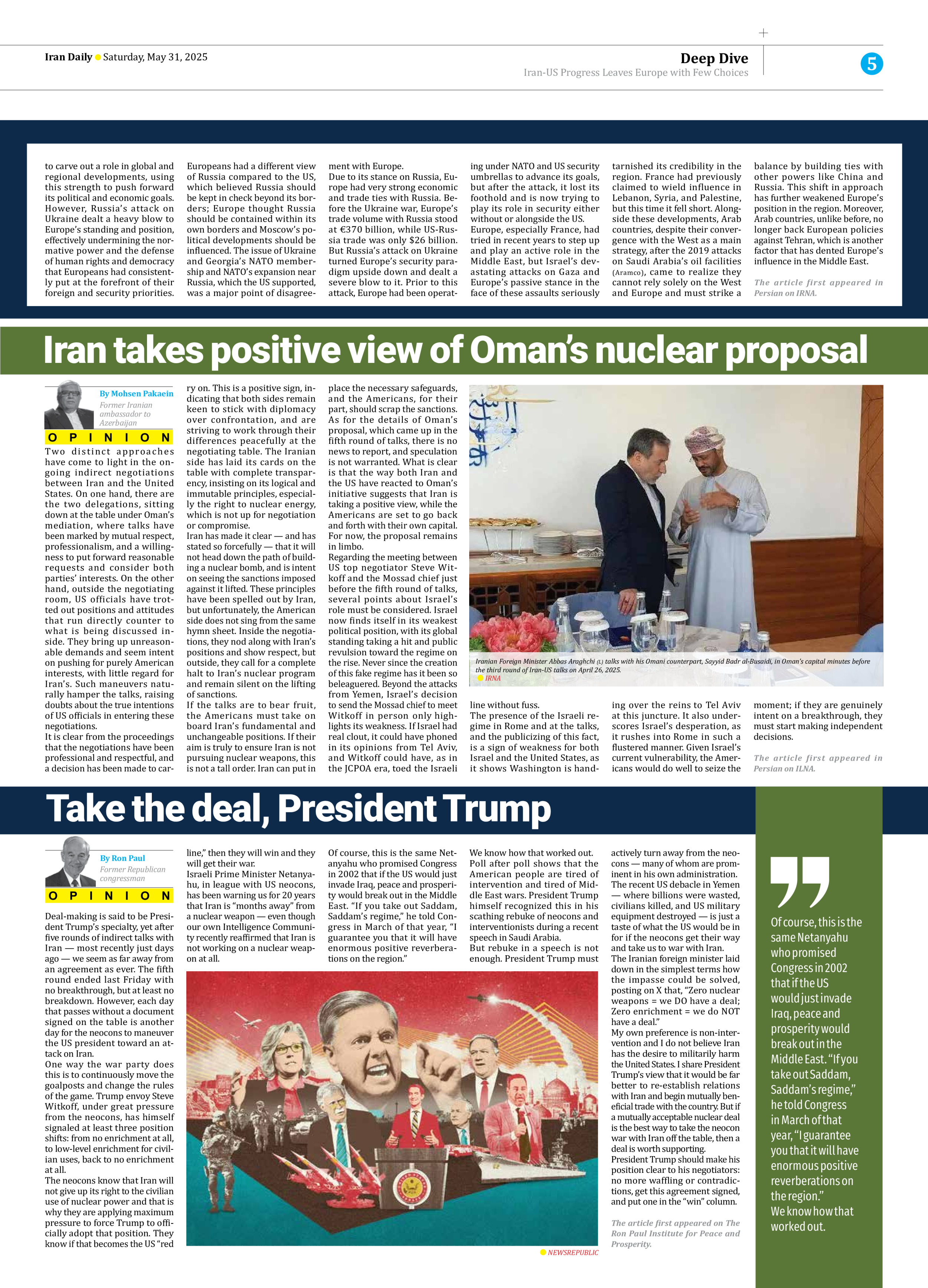
Iran takes positive view of Oman’s nuclear proposal
By Mohsen Pakaein
Former Iranian ambassador to Azerbaijan
Two distinct approaches have come to light in the ongoing indirect negotiations between Iran and the United States. On one hand, there are the two delegations, sitting down at the table under Oman’s mediation, where talks have been marked by mutual respect, professionalism, and a willingness to put forward reasonable requests and consider both parties’ interests. On the other hand, outside the negotiating room, US officials have trotted out positions and attitudes that run directly counter to what is being discussed inside. They bring up unreasonable demands and seem intent on pushing for purely American interests, with little regard for Iran’s. Such maneuvers naturally hamper the talks, raising doubts about the true intentions of US officials in entering these negotiations.
It is clear from the proceedings that the negotiations have been professional and respectful, and a decision has been made to carry on. This is a positive sign, indicating that both sides remain keen to stick with diplomacy over confrontation, and are striving to work through their differences peacefully at the negotiating table. The Iranian side has laid its cards on the table with complete transparency, insisting on its logical and immutable principles, especially the right to nuclear energy, which is not up for negotiation or compromise.
Iran has made it clear — and has stated so forcefully — that it will not head down the path of building a nuclear bomb, and is intent on seeing the sanctions imposed against it lifted. These principles have been spelled out by Iran, but unfortunately, the American side does not sing from the same hymn sheet. Inside the negotiations, they nod along with Iran’s positions and show respect, but outside, they call for a complete halt to Iran’s nuclear program and remain silent on the lifting of sanctions.
If the talks are to bear fruit, the Americans must take on board Iran’s fundamental and unchangeable positions. If their aim is truly to ensure Iran is not pursuing nuclear weapons, this is not a tall order. Iran can put in place the necessary safeguards, and the Americans, for their part, should scrap the sanctions.
As for the details of Oman’s proposal, which came up in the fifth round of talks, there is no news to report, and speculation is not warranted. What is clear is that the way both Iran and the US have reacted to Oman’s initiative suggests that Iran is taking a positive view, while the Americans are set to go back and forth with their own capital. For now, the proposal remains in limbo.
Regarding the meeting between US top negotiator Steve Witkoff and the Mossad chief just before the fifth round of talks, several points about Israel’s role must be considered. Israel now finds itself in its weakest political position, with its global standing taking a hit and public revulsion toward the regime on the rise. Never since the creation of this fake regime has it been so beleaguered. Beyond the attacks from Yemen, Israel’s decision to send the Mossad chief to meet Witkoff in person only highlights its weakness. If Israel had real clout, it could have phoned in its opinions from Tel Aviv, and Witkoff could have, as in the JCPOA era, toed the Israeli line without fuss.
The presence of the Israeli regime in Rome and at the talks, and the publicizing of this fact, is a sign of weakness for both Israel and the United States, as it shows Washington is handing over the reins to Tel Aviv at this juncture. It also underscores Israel’s desperation, as it rushes into Rome in such a flustered manner. Given Israel’s current vulnerability, the Americans would do well to seize the moment; if they are genuinely intent on a breakthrough, they must start making independent decisions.
The article first appeared in
Persian on ILNA.







